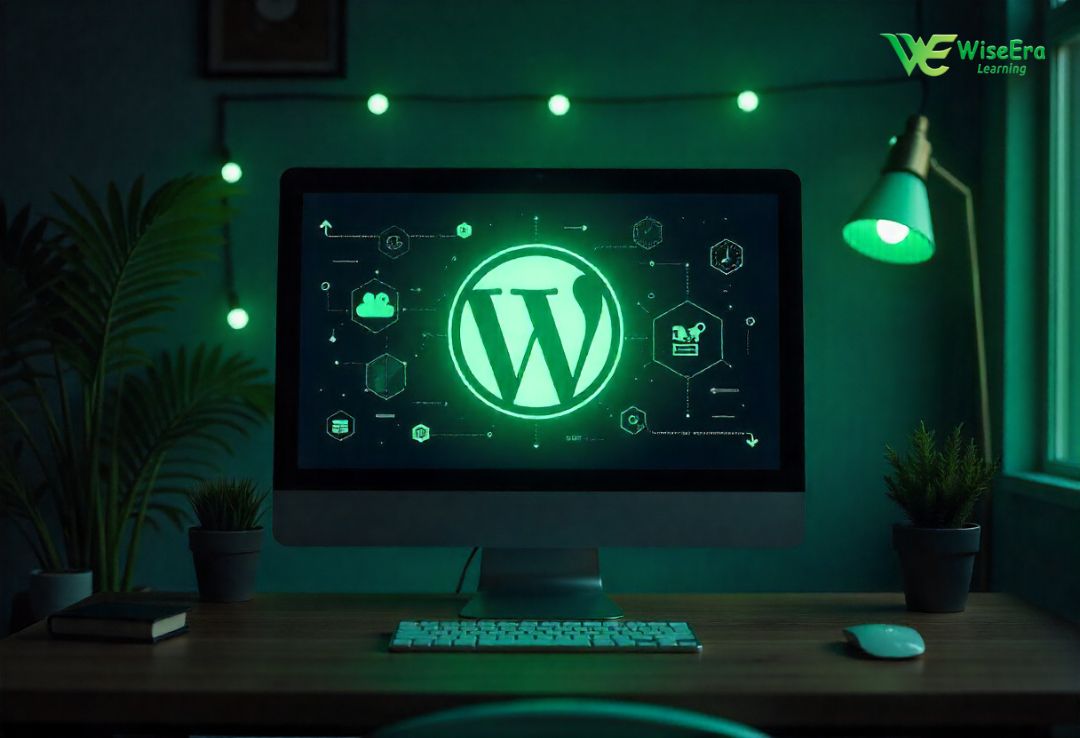
WordPress still remains the most preferred platform for different kinds of users in cyberspace, such as website owners, bloggers, and online businessmen. WordPress is heard of by most people who want to create their portfolio on a blog, set up e-commerce for their SMBs, or just write in case many individuals would read them. But what exactly is it? What makes millions of people use it as a website builder?
This platform goes beyond being just a simple content editor; it is an extremely effective Content Management System that enables users at all levels of experience to create interactive, dynamic websites quickly. With good reasons too; why do other options get overlooked by people when they see everything that there is to see about this incredible software, which can be customized in any way one pleases? Its open-source nature, easy editing features, and wide collection of plugins, among other attributes, account for its dominant use, exceeding forty percent across the globe.
This guide covers everything about WordPress, including where it came from, what versions are available, how you can apply it and why SEO is important for this matter. You will discover the reasons behind its popularity among web developers, bloggers, and eCommerce brands. After reading through this post, you will understand WordPress better and be able to determine whether or not it can work best for you too in creating your online identity.
Table of Contents
- What is WordPress?
- A Brief History of WordPress
- WordPress.com versus WordPress.org: Which One to Choose?
- What Makes WordPress the Best Choice for Your Site?
- Getting Familiar with the WordPress Dashboard
- Key Features of WordPress
- Pros and Cons of WordPress
- Themes in WordPress: What They Are and How They Work
- Plugins in WordPress: Extend Your Website’s Power
- How to Install WordPress
- Types of Websites You Can Build with WordPress
- Is WordPress Good for SEO?
- Security in WordPress
- Common WordPress Mistakes to Avoid
- WordPress vs Other Website Builders
- How To Earn Money Using WordPress
- Conclusion: Is It Wise To Use WordPress?
1. What is WordPress?
Initially intended for blogging, WordPress has changed through time to serve as an efficient platform for creating any kind of website. This is a very useful tool that can be applied in developing websites or online stores without experiencing many problems.
At present, a huge number of websites use WordPress as their platform. The reason why people prefer it is because of how flexible it is; if you want to create a simple blog, a complex business site, or an e-commerce project with thousands of products—in any case, there will be all necessary options in WP for this purpose. It’s very easy to work with, and that’s why most people would prefer using WordPress among other available platforms, especially those who are not technically experienced.
2. A Brief History of WordPress
In 2003, the developers Matt Mullenweg and Mike Little created WordPress as a fork of a blogging tool called b2/cafelog. They intended to make a free and open-source publishing platform that could be easily accessed by all.
WordPress, which has experienced numerous revisions since it was launched. Some of the important stages are the introduction of plugins (2004) and themes (2005), as well as the Gutenberg editor (2018). These changes changed WordPress from being just a simple blogging platform to the complex CMS that we see nowadays.
Users can appreciate the stability, support, and innovation provided by the community in WordPress better when they understand how it has changed over time.
3. WordPress.com versus WordPress.org: Which One to Choose?
Although WordPress.com and WordPress.org are often mixed up by new users, they are not similar.
| Feature | WordPress.com | WordPress.org |
| Hosting | Hosted by WordPress | Self-hosted (you choose the host) |
| Flexibility | Limited customization | Full control over everything |
| Plugins & Themes | Restricted access | Unlimited access |
| Monetization Options | Limited | Full freedom |
- If you need flexibility and control, then WordPress.org is the platform to use whether you are a business person, blogger or developer.
- For simple bloggers and non-commercial ventures, WordPress.com is enough.
Whoever wants to create a professional website should pay attention to this difference.
4. What Makes WordPress the Best Choice for Your Site?
Although there are several website builders, but most individuals favor WordPress because
- It is open-source and free: there are no charges for a license.
- Customizable: There are thousands of themes and plugins that can be used.
- SEO-friendly: It is constructed with clean code and allows for easy integration with SEO plugins.
- Mobile responsive: It can be viewed on any device without a problem.
- Scalable: It can grow with your business, whether you have a small blog or a huge company website.
WordPress gives incomparable adaptability whether you’re creating a little business site, digital portfolio or WooCommerce store.
5. Getting Familiar with the WordPress Dashboard
After WordPress installation, you will meet the dashboard; which is the central controlling point of your site. It consists of important features such as:
- Posts – these are meant for blog articles
- Pages – pages contain static information e. g., about us or contact
- Media – this is your image and file library
- Appearance – here you can change themes and make other customizations
- Plugins – added functions here
- Settings – all-site configurations
Even if you are new, you will find it easy to use the WordPress dashboard. With this dashboard, one can handle every part of his/her site at the same place; no coding knowledge required.
6. Key Features of WordPress
Here are some of the most powerful features of WordPress:
- Gutenberg Block Editor for drag-and-drop editing
- Media management for easy uploads
- User roles and permissions for teams
- Multilingual support
- Built-in blogging functionality
- SEO tools and plugin compatibility
These features make WordPress ideal for content creators, marketers, and business owners alike.
7. Pros and Cons of WordPress
Pros:
- Highly customizable
- SEO-friendly
- Huge support community
- Thousands of plugins & themes
Cons:
- Can be vulnerable without proper security
- Learning curve for complete beginners
- Requires regular updates
Despite a few drawbacks, the benefits of WordPress outweigh the limitations, especially with good hosting and maintenance.
8. Themes in WordPress: What They Are and How They Work
Themes determine your website’s look and layout. With WordPress, you can:
- Choose from thousands of free and premium themes
- Customize them with the WordPress Customizer
- Use page builders like Elementor or Divi
Themes are crucial for user experience and branding. You can switch themes without losing content, making WordPress highly adaptable.
9. Plugins in WordPress: Extend Your Website’s Power
Plugins are small software components that add features to your site. Popular plugin types include:
- SEO plugins (e.g., Yoast SEO)
- Security plugins (e.g., Wordfence)
- eCommerce plugins (e.g., WooCommerce)
- Form builders (e.g., WPForms)
With over 59,000 plugins available, you can enhance functionality without writing code, which is a major strength of WordPress.
10. How to Install WordPress
Installing WordPress is straightforward:
Method 1: One-Click Installation
Most hosting providers offer this feature through cPanel.
Method 2: Manual Installation
- Download WordPress from WordPress.org
- Upload to your hosting server
- Create a MySQL database
- Run the WordPress installation script
Either method takes less than 10 minutes, making WordPress beginner-friendly.
11. Types of Websites You Can Build with WordPress
With WordPress, the possibilities are endless:
- Personal blogs
- Business websites
- eCommerce stores
- Online courses (LMS)
- Membership sites
- Portfolio websites
- News or magazine sites
This flexibility makes WordPress the go-to platform for developers and entrepreneurs alike.
12. Is WordPress Good for SEO?
Absolutely. WordPress is designed with SEO in mind:
- Clean, semantic code
- SEO plugins like Yoast SEO and Rank Math
- Easy metadata control
- Custom URL structures
- XML sitemap support
It enables users to implement both basic and advanced on-page SEO strategies, improving visibility on search engines.
13. Security in WordPress
Security is a major concern for all website owners. Fortunately, WordPress can be secure when managed correctly:
- Use strong usernames and passwords
- Install security plugins (e.g., iThemes Security)
- Keep themes and plugins updated
- Regular backups via plugins like UpdraftPlus
By following best practices, you can make WordPress highly secure and reliable.
14. Common WordPress Mistakes to Avoid
Here are common pitfalls beginners face:
- Using too many plugins
- Ignoring updates
- Not setting up backups
- Choosing unreliable hosting
- Using weak login credentials
Avoiding these mistakes ensures your WordPress site remains fast, secure, and user-friendly.
15. WordPress vs Other Website Builders
Compared to Wix, Squarespace, and Shopify, WordPress offers:
| Feature | WordPress | Wix/Squarespace | Shopify |
| Flexibility | High | Low | Medium |
| SEO Control | Advanced | Basic | Basic |
| Customization | Unlimited | Limited | Medium |
| Cost | Affordable | Subscription | Subscription |
WordPress stands out for users who value full control and scalability.
16. How to Make Money with WordPress
There are many ways to monetize your WordPress website:
- Affiliate marketing
- Google AdSense
- Selling products with WooCommerce
- Offering services or courses
- Membership/subscription models
With the right strategy, WordPress can become a source of passive income or a full-time business platform.
17. Final Thoughts: Should You Use WordPress?
If you’re looking for a flexible, scalable, and SEO-friendly platform, WordPress is the top choice. It’s perfect for:
- Bloggers wanting to grow an audience
- Businesses aiming for a strong web presence
- Developers building custom solutions
- Creators launching online stores
With the right setup, you can build virtually any type of website using WordPress, making it a smart investment in your digital future.
FAQ (Frequently Asked Questions)
1. Is WordPress free to use?
Yes, WordPress is free because it is open-source. It can be freely downloaded and used without any licensing issues. Nevertheless, in case of a self-hosted WordPress. org site, one would have to pay for the web hosting as well as for the domain name.
2. Is knowledge of coding necessary in using WordPress?
No, you do not have to be a programmer to operate WordPress. It comes with an easy-to-use interface and drag-and-drop editor such as Elementor. That said, having some programming experience may come in handy for customization.
3. What exactly is the dissimilarity between WordPress. org and WordPress. com?
WordPress.org allows self-hosting which means that one can have absolute control over the site. On the other hand, WordPress.com is hosted yourself but with some restrictions on using plugins, customization options as well as being able to monetize it.
4. Is WordPress good for Is WordPress effective in SEO?SEO?
Definitely! The SEO features of WordPress are superb since it has friendly permalinks, allows one to easily change meta data, adapts well on all devices plus there are excellent SEO plugins like Yoast SEO and Rank Math.
5. Is it possible to make use of WordPress for e-commerce?
Definitely yes! By utilizing plugins such as WooCommerce, you can transform your WordPress website into an online store that sells goods just like any other – with its unique pages for products offered, secure payment methods available etc.




